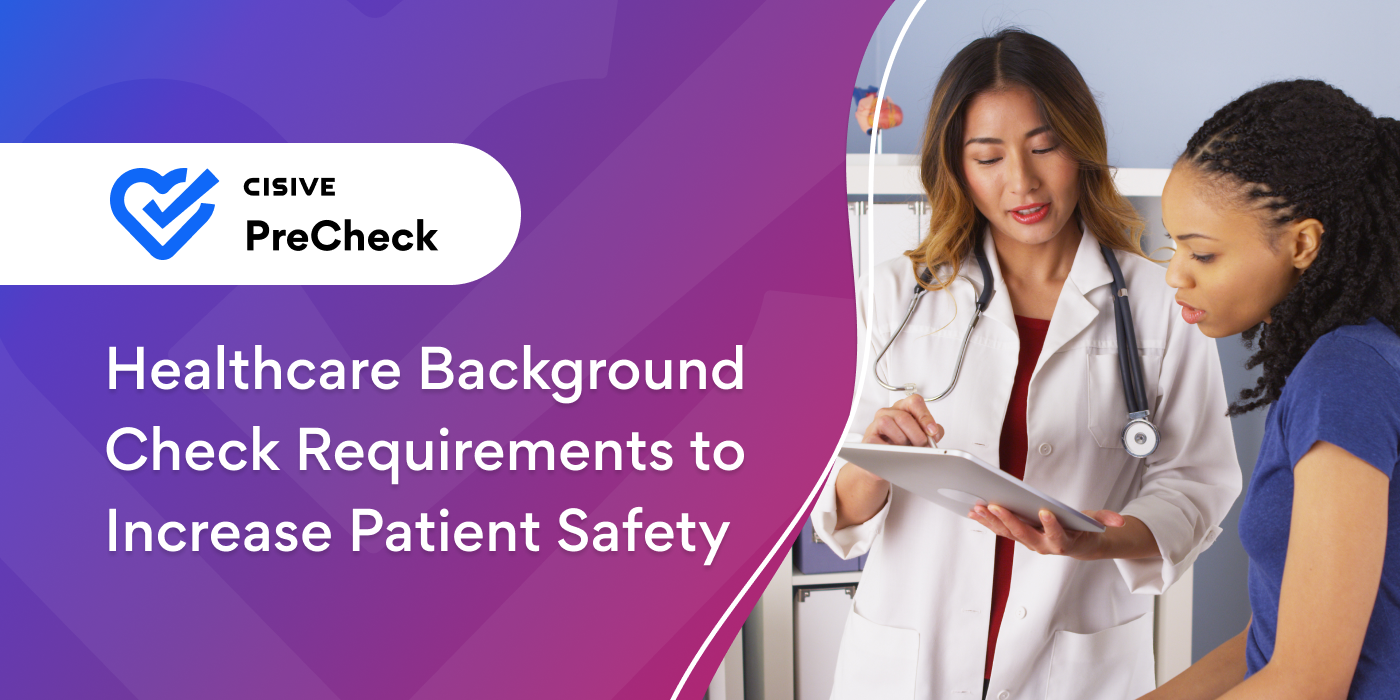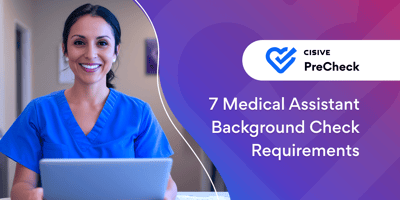

While employers are evaluating background screening services or making policy decisions about...

It's important to understand and comply with your state's healthcare background check requirements. Most states regulate who can work in the healthcare industry because healthcare workers interact with the most vulnerable in society.
Here are the main factors to consider concerning healthcare background checks:
It’s hard to imagine someone in the healthcare industry being dishonest in their resume, but it happens a lot more than you would think.
Healthcare background checks help keep people honest, especially when they know that misrepresenting their qualifications could cost them an employment opportunity.
Most states have regulations governing healthcare background check requirements because there's a lot at stake.
Comprehensive screening protects the vulnerable and can protect your staff and the reputation of your organization or practice.
Key TakeawaysHere’s what you need to know about healthcare background check requirements:
|

While compliance with state regulations is very important, that's not the only reason to conduct comprehensive healthcare background checks.
A December 2024 report shows that 17% of healthcare workers admitted to lying on their resumes to get a job. While this is less than the 32% average of all industries combined, it’s a much higher number than you would expect for such a regulated industry.
The most important reason to have a healthcare background check is because it protects your patients.
The qualifications of the people your patients have caring for them directly affect their health and safety.
Healthcare background checks also protect your staff and work environment by screening out potentially harmful or even dangerous workers.
Minimizing accidents with safer hiring practices also helps protect your visitors.
A healthcare background check gives a complete picture of the education, work experience, and criminal record of any candidate you’re considering hiring. It also involves verifying licenses to ensure they’re up-to-date and active.
This helps you find qualified candidates who have the proper credentials, training, and experience for the position you’re hoping to fill. Hiring someone unqualified can leave you open to malpractice lawsuits.
Because many states regulate healthcare workers, background check requirements can change constantly.
Hiring someone without meeting the nurse or doctor background check requirements in your state can leave you vulnerable to civil penalties for non-compliance with local regulations.
Any business’s reputation, whether it’s in healthcare or any other industry, is built on trust.
Proper background investigation mitigates risk by identifying issues such as substance use, inappropriate behaviors, or potential criminal activity.
A tarnished reputation isn’t the worst-case scenario. Without thorough background checks, you run the risk that the wrong person could come into your practice or organization and cause problems big enough that they could put an end to your business.
Healthcare background checks differ from employment background checks in other industries because they're usually state-regulated.
Even if your state has no laws governing healthcare background checks, checking the following protects your patients and practice or organization.
Before you can even begin an accurate background check, you have to verify that the candidate is the person they say they are. Any information you gather after someone has misrepresented their identity is useless.
Without this verification, you could unknowingly allow someone near your patients or staff who has a criminal record or has lost their license due to malpractice or ethical violations.
In a healthcare setting, medical errors and other safety issues could cause harm to your patients.
Also, someone who is already engaging in identity theft would have access to more personal information they could use for their own purposes.
Identity verification helps protect your organization from HIPAA violations and other security issues and can lead to greater patient trust, loyalty, and satisfaction with their care.
With the proliferation of AI-assisted writing, it’s easier than ever to fabricate educational information on a resume. There are even services that will provide counterfeit degree certificates and forged transcripts.
Education verification ensures that your potential healthcare worker has the state-required degree and training for the position.
Many positions in the healthcare industry require up-to-date licenses in the state where medical personnel are practicing. It’s important to verify the license rather than just accept when a candidate says their license is current.
Employment verification is another area subject to scams. For a fee, services will supply a verification of employment at a non-existent company that includes a website, email address, and even a phone number for a phony boss or HR department to answer.
In the healthcare industry, it’s important to detect these types of fraudulent practices and verify actual employment history, including dates, terminations, and any issues that the potential worker might want to hide.
Accurate and thorough education, licensure, and employment verifications help protect your patients and build trust in your organization.
A national criminal background check is a quick scan of databases and criminal records registries from all 50 states, Washington DC, and U.S. territories.
While this is a fast and easy place to start, it’s not thorough enough to find all criminal records.
One reason for that is because many local courts don’t post their records online. Another reason is that records that are posted may be inaccurate.
The most thorough and comprehensive criminal background search includes a check in state, county, and local court records. Any records that are found need to be verified to ensure that they’re accurate.
If you refuse to hire someone based on an inaccurate record, your organization or practice could end up facing a lawsuit or fines for non-compliance with Fair Credit Reporting Act (FCRA) regulations.
The Office of the Inspector General (OIG) maintains the List of Excluded Individuals/Entities (LEIE) barred from receiving federal funds. This is usually because they have been convicted of certain crimes.
Employing someone on the federal exclusion list may prevent your practice or organization from participating in programs like Medicaid and Medicare that are federally funded or subject your practice or organization to civil monetary penalties.
While it’s unlikely you'll be hiring a suspected terrorist in the healthcare industry, this can happen.
The federal government maintains a record of individuals barred from working in certain federal and state positions, including healthcare. Important watchlists to check include:
While your practice or organization may be private, any involvement with federal programs, such as Medicare or Medicaid, puts you at an obligation to make sure you aren’t hiring someone on one of these lists.
Regardless, if the government doesn’t think a person is safe, you wouldn’t want them to work around your staff or patients either.
According to safehome.org, there are over 700,000 registered sex offenders nationwide as of 2023. This includes those who have faced charges for sex crimes in addition to those who have pled guilty or been convicted.
A national sex offender search for healthcare professionals is critical because they have regular interactions with vulnerable adults and children. Mistakenly hiring a sex offender puts your patients and staff at risk and could potentially be damaging to the reputation of your practice or organization.
Because drug use can affect patient care and safety, drug screening is an important part of a healthcare background check.
With powerful prescription drugs in easy access to healthcare workers, it’s important to know if a potential candidate has a history of substance abuse. Studies show that 20% of nurses and 15% of physicians will struggle with drug or alcohol abuse in their lifetime.
Without drug screening, you can create a potential liability if there’s a medical error or safety incident due to impaired judgment or performance that involves substance abuse. Drug screening helps protect your patients, staff, and the reputation of your practice or organization.
This is a database of disciplinary actions taken against former healthcare employees by their employers.
Because healthcare workers are exposed to communicable diseases, it’s important to verify that their immunizations are up-to-date.
Healthcare workers have direct access to patients and play a pivotal role in their care. For the protection of both the patient and your organization, there are certain items background screening can uncover that could disqualify the candidate from working in the field.
For instance, being on the federal exclusion list could instantly disqualify an application. Here’s a look at a few other disqualifiers.
Falsifying information on an application or resume could be grounds for immediate disqualification. For example, candidates who falsify their educational records, previous work experience, or professional credentials risk disqualification for any role in the healthcare industry.
A failed drug test can also lead to disqualification of a candidate. Even current employees who fail random drug test are at risk of losing their job.
An employee with a current drug or alcohol issues is at higher risk of mistakes, accidents, and malpractice.
Many states regulate healthcare background checks in general and have different doctor healthcare background check requirements compared to nurse healthcare background check requirements. Also, these regulations change frequently.
For example, nursing requirements in Arizona are governed by the Arizona State Board of Nursing (AZBN), which requires a fingerprint clearance card. Some states also have hospital healthcare background check requirements.
To keep your organization compliant with ever-changing state regulations, you need an expert in accurate and comprehensive healthcare background checks.
With so much at stake for highly regulated healthcare organizations, healthcare employers can't afford to miss important information or fall behind with state requirements. At PreCheck, our team of FCRA-certified experts will provide thorough, accurate, and compliant healthcare background checks on your prospective candidates.
PreCheck, a Cisive company, has over 30 years of healthcare experience. Cisive is known for its 99.9994% accurate criminal background checks that minimize the risk of your organization or practice having to face FCRA violations.
Find out how PreCheck can help your practice or organization protect its patients, staff, and reputation with comprehensive and accurate healthcare background checks that meet your state's healthcare background check requirements. Speak with an expert today.
Author: Jenni Gallaway
Bio: Content Marketing Manager at Cisive. 8 years of experience in the background screening industry.
Let's Connect on LinkedIn
While employers are evaluating background screening services or making policy decisions about...
.png?height=200&name=BLOG%20IMAGE_%20Tech%20Guru%20(Cisive).png)
You’ve seen this show before. The Detective walks into the open floor plan office shouting “I need...

Every medical assistant plays a central role in handling confidential data and interacting with...